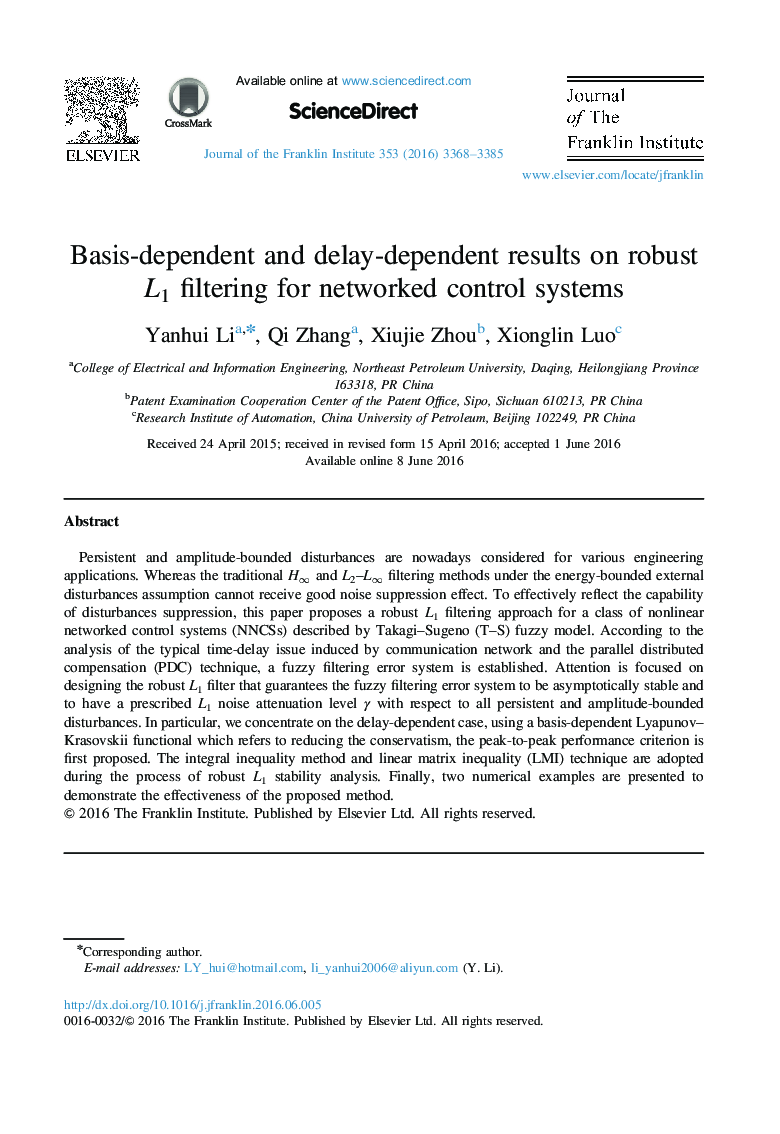| کد مقاله | کد نشریه | سال انتشار | مقاله انگلیسی | نسخه تمام متن |
|---|---|---|---|---|
| 560018 | 1365539 | 2016 | 18 صفحه PDF | دانلود رایگان |
• A valuable L1L1performance criterion is proposed for NNCSs based on T–S fuzzy model. In many engineering applications, the external disturbances of control systems, are generally persistent and amplitude-bounded signals. In such circumstances, the L1 norm appears to be more adequate as a measurement index of input and output signals, and, most notably, a limited number of literatures concern on L1 performance.
• Much less conservative results are provided to design the robust L1L1filter for T–S fuzzy networked control systems based on a basis-dependent Lyapunov–Krasovskii functional with considering the delay-dependent case. Instead of using a traditional Lyapunov–Krasovskii, our intention is based on new basis-dependent one, which can lessen the design conservatism. The results obtained through this approach are both basis-dependent and delay-dependent.
• In consideration with the network-based environment with time-delay, the systematic design method of the admissible robust L1L1filter is proposed and provides a reference for practical applications. It is generally known that there is a lack of systematic theoretical and numerical developments on the L1 filtering problem for nonlinear systems especially for actual objects. Therefore, research on persistent heavy noise suppression mechanism for NNCSs has very important theoretical and practical guidance significance.
Persistent and amplitude-bounded disturbances are nowadays considered for various engineering applications. Whereas the traditional H∞H∞ and L2–L∞L2–L∞ filtering methods under the energy-bounded external disturbances assumption cannot receive good noise suppression effect. To effectively reflect the capability of disturbances suppression, this paper proposes a robust L1 filtering approach for a class of nonlinear networked control systems (NNCSs) described by Takagi–Sugeno (T–S) fuzzy model. According to the analysis of the typical time-delay issue induced by communication network and the parallel distributed compensation (PDC) technique, a fuzzy filtering error system is established. Attention is focused on designing the robust L1 filter that guarantees the fuzzy filtering error system to be asymptotically stable and to have a prescribed L1 noise attenuation level γ with respect to all persistent and amplitude-bounded disturbances. In particular, we concentrate on the delay-dependent case, using a basis-dependent Lyapunov–Krasovskii functional which refers to reducing the conservatism, the peak-to-peak performance criterion is first proposed. The integral inequality method and linear matrix inequality (LMI) technique are adopted during the process of robust L1 stability analysis. Finally, two numerical examples are presented to demonstrate the effectiveness of the proposed method.
Journal: Journal of the Franklin Institute - Volume 353, Issue 14, September 2016, Pages 3368–3385
